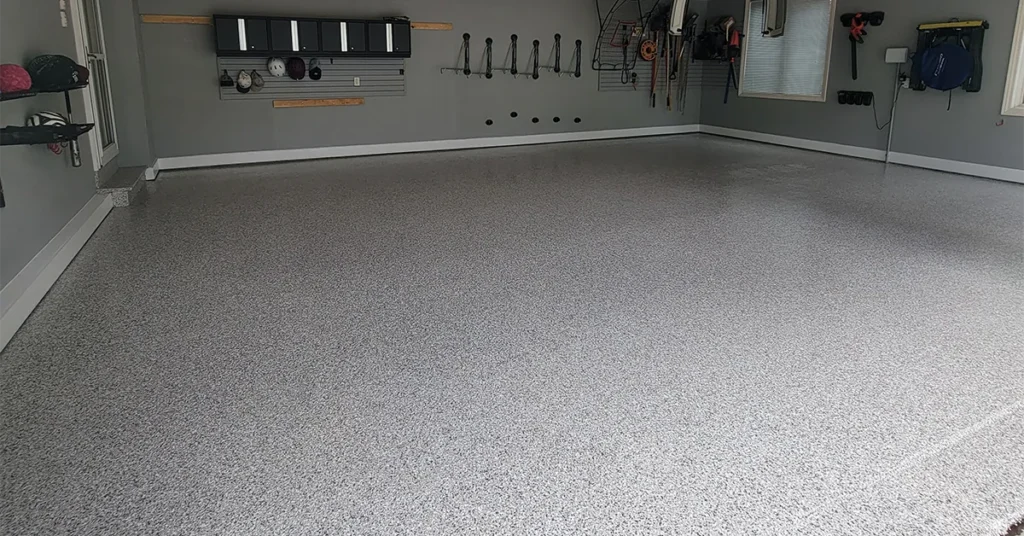Your epoxy garage floor is more than just a coating; it’s an investment that makes your garage look amazing and work better. But just like any valuable surface in your home, it needs proper care to stay looking its best. Whether you’re dealing with oil stains, everyday dirt, or just want to keep that showroom shine, learning how to clean your garage floor properly will keep it beautiful for years to come.
Don’t worry if you think floor maintenance is complicated. Cleaning epoxy floors is actually easier than you might expect. With the right techniques and simple supplies you already have at home, you can tackle any mess and keep your garage floor looking brand new.
Why Clean Garage Floors Need Regular Attention
Your garage sees a lot of action. Cars drip oil, tools get dropped, kids track in mud, and snow melts off vehicles in winter. Even the toughest epoxy coating can start looking dull without regular cleaning.
The good news? Epoxy floors are naturally stain-resistant and easy to clean. The smooth, non-porous surface doesn’t absorb spills like bare concrete does. This means most messes sit on top, where you can easily wipe them away if you act quickly.
Regular cleaning also protects your investment. Professional installers recommend washing the entire floor every three to four months or as needed if your garage is exceptionally busy. This simple routine prevents dirt from building up and keeps your floor’s protective coating in perfect condition.
The Best Cleaning Solutions for Epoxy Floors
Not all cleaners are created equal when it comes to epoxy floors. Avoid cleaners with citrus, acidic, or vinegar solutions, as these tend to dull the shine.
Top Choice: Ammonia Solution. The cleaning solution that works best for epoxy and other garage floor coatings is ammonia. Use ½ cup of ammonia to one gallon of hot water in a bucket. This creates a powerful cleaning solution that cuts through grease and grime without damaging your floor’s finish.
Other Effective Options:
- Warm water with a few drops of dish soap
- Commercial pH-neutral floor cleaners
- Simple Green diluted according to package directions
What to Avoid:
- Bleach-based cleaners
- Citrus cleaners
- Acidic solutions like vinegar
- Abrasive cleaners or scrubbers
How to Remove Oil Stains from Your Epoxy Garage Floor
Oil stains are probably the biggest challenge garage floors face. The key is acting fast, but even old stains can often be removed with the right approach.
Fresh Oil Spills
You must remember that you should never let the chemicals sit on the floor too long. Here’s what to do:
- Absorb the spill: Use paper towels or shop rags to soak up as much oil as possible.
- Apply dish soap: Squeeze a generous amount directly on the stain.
- Scrub gently: Use a soft brush or scrubbing sponge with warm water.
- Rinse thoroughly: Remove all soap residue with clean water.
- Dry completely: Use towels or let air dry.
Stubborn or Old Oil Stains
For tougher stains that have been sitting longer, you need a stronger approach. Mix up a solution of ammonia and water for large stains that have been sitting for a while. The correct recipe is 4 or 5 ounces of ammonia per gallon of water.
Step-by-Step Process:
- Mix the ammonia solution in a bucket.
- Apply the stain and let it sit for 15-20 minutes.
- Use warm water and a kitchen scrubbing sponge or soft deck brush to remove the stain. Be sure to scrub lightly to see the best results.
- Rinse thoroughly with clean water.
- Repeat if necessary
Alternative Methods for Tough Stains
If the ammonia solution doesn’t work, try these methods:
Powdered Laundry Detergent: Grab some powdered laundry detergent, create a soapy mixture with warm water, and scrub the stain with this paste.
Heavy-Duty Cleaners: Trisodium phosphate (TSP) or a heavy-duty phosphate-free cleaner will do the trick. Dilute the cleaner in a gallon of hot water, pour it onto the oil stain, and soak for 20 to 30 minutes.
Commercial Degreasers: Try misting the floor with water, then spraying on a cleaner such as Simple Green or Super Clean. Scrub well with a long-handled brush, then rinse well.
Tackling Other Common Garage Floor Stains
Tire Marks
These black scuff marks are common but easy to remove. Use the ammonia solution and scrub with a soft brush. The marks should lift right off.
Salt Stains (Winter Road Salt)
Winter road salt can leave white, chalky residues. Regular mopping with warm water usually removes these, but stubborn stains may need the ammonia solution.
Grease and Grime
Heavy grease buildup responds well to dish soap or degreasing cleaners. Apply, let sit for a few minutes, then scrub and rinse.
Paint Drips
Small paint spills often peel off once dry. For liquid paint, absorb immediately and clean with soap and water.
Tools You’ll Need for Effective Floor Cleaning
Having the right tools makes cleaning much easier and more effective:
Essential Cleaning Tools:
- Microfiber mop (better than traditional string mops)
- Soft-bristled brush or scrubbing sponge
- Squeegee for quick drying
- Bucket for mixing solutions
- Paper towels or shop rags
- Rubber gloves for protection
Nice-to-Have Tools:
- A bi-weekly deep cleaning that uses a mechanical advantage, such as a power washer or rotary scrubber, can provide exceptional results
- Leaf blower for quick debris removal
- pH test strips to check cleaning solutions
How Often Should You Clean Your Epoxy Garage Floor?
The frequency depends on how much your garage gets used, but here’s a general schedule:
Daily: Quick sweep and immediate spill cleanup
Weekly: Thorough mopping with cleaning solution
Monthly: Wash the entire floor every three to four months or as needed if your garage is exceptionally busy
Seasonally: Deep clean and inspect for any damage or wear
Protecting Your Investment: Prevention Tips
Maintaining epoxy garage floors involves regular cleaning and preventative measures to protect the coating. Smart prevention saves you time and keeps your floor looking great:
Smart Prevention Strategies:
- Place drip pans under vehicles with known leaks
- Use floor mats in high-traffic areas
- Keep a small broom and dustpan in the garage for quick cleanups
- Address spills immediately, even if you plan to deep clean later
- Avoid dragging heavy objects across the floor
What NOT to Do When Cleaning Epoxy Floors
Avoid these common mistakes that can damage your beautiful epoxy coating
- Don’t use steel wool or abrasive scrubbers – These can scratch the surface
- Don’t let chemicals sit too long – Even cleaning solutions can cause problems if left on the surface
- Don’t use acidic cleaners – These dull the shine and can damage the coating
- Don’t ignore small problems – Address stains and damage quickly before they get worse
- Don’t drag sharp objects – Always lift heavy items instead of dragging them
FAQs
Can I use bleach to clean my epoxy garage floor?
No, avoid bleach-based cleaners on epoxy floors. They can cause discoloration and damage the protective coating. Stick with ammonia-based solutions or pH-neutral cleaners instead.
How long should I wait after installation before cleaning my epoxy floor?
Most epoxy floors can be lightly cleaned after 24-48 hours, but wait at least a week before doing heavy cleaning or using strong cleaning solutions. Check with your installer for specific recommendations
What should I do if my floor starts looking cloudy or dull?
Cloudiness usually comes from using the wrong cleaners or not rinsing properly. This can happen with any coating type, epoxy, polyaspartic, or combination systems. Try cleaning with just warm water and a microfiber mop first. If the problem persists, contact your floor installer for advice specific to your coating system.
Can I use a pressure washer on my epoxy garage floor?
Yes, but use low pressure and avoid getting too close to the surface. High pressure can damage the coating, especially around edges and seams. A garden hose often works just as well.
How do I remove hot tire pickup marks from my epoxy floor?
Black marks from hot tires are common and usually come off with ammonia cleaning solution and light scrubbing. For stubborn marks, try a plastic scraper to gently remove the rubber residue first.
Is it normal for my epoxy floor to show scratches over time?
Minor scratches from normal use are normal, especially in high-traffic areas. Most small scratches don’t affect the floor’s protection. Deep scratches or damage should be addressed by a professional.
Conclusion
Cleaning your epoxy garage floor doesn’t have to be complicated or time-consuming. With regular maintenance and the right techniques, you can keep your floor looking showroom-ready for years to come.
Remember the key points: act quickly on spills, use the right cleaning solutions, and maintain a regular cleaning schedule. Your epoxy floor is designed to be durable and easy to maintain, so don’t overthink it. A little effort goes a long way toward protecting your investment and keeping your garage looking its best.
Whether you’re dealing with oil stains, everyday dirt, or just want to maintain that professional appearance, these techniques will help you clean your garage floor like a pro. Your neighbors will wonder how you keep your garage looking so good!


